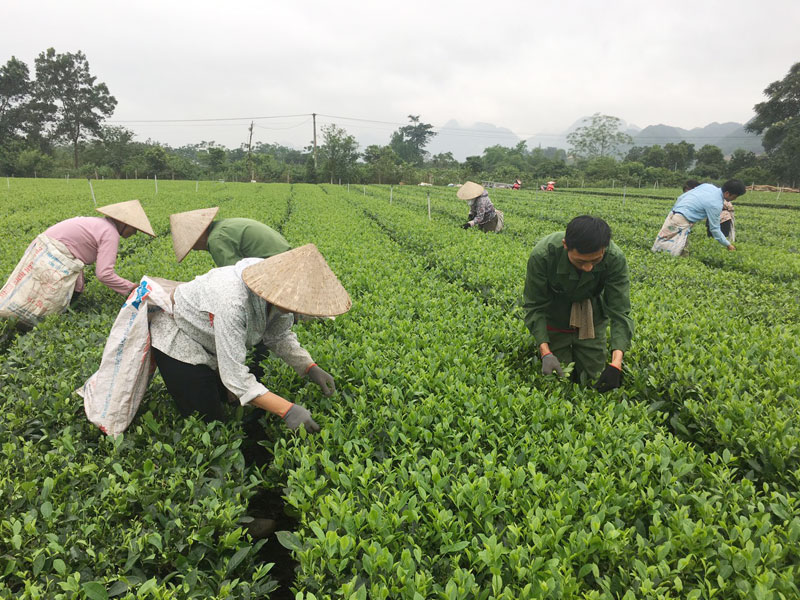
(HBO) – Lac Thuy district in the northern province of Hoa Binh has built a plan to implement the One Commune, One Product (OCOP) programme for the 2019-2020 period, close to the local situation.
 Song Boi tea of Song Boi One Member Limited Liability Company
in Hamlet A1, Co Nghia commune, is an OCOP product of Lac Thuy district. The
product was registered for code and bar code.
Song Boi tea of Song Boi One Member Limited Liability Company
in Hamlet A1, Co Nghia commune, is an OCOP product of Lac Thuy district. The
product was registered for code and bar code.
There are about 15 key products in Lac Thuy
district, focusing on the group of food products such as Song Boi tea, Lac Thuy
orange, Lac Thuy honey, Lac Thuy chicken and eggs, Dong Tam goat meat and
custard apple, sugar Queen melon, and VietGAP cucumber; the group of beverages;
the group of herbal products; the group of fabric and garment products; the
group of souvenir – interior decoration products; and the group of rural
tourism service products.
Lac Thuy district has registered four products
to join the OCOC programme in 2019, mainly in the group of food products
including Song Boi tea of Song Boi One Member Limited Liability Company in
hamlet A1, Co Nghia commune; Lac Thuy orange of four households: Pham Thi Lan
in Tan Phu hamlet, Phu Thanh commune; Ngo Dinh Khoi in Lien Phu 1 hamlet, An Lac commune; Bui Van
Chung in Dong Thung hamlet, Co Nghia commune; and Vu Duy Tan in Dong Huong
hamlet, Lien Hoa commune, as well as Lac Thuy chicken products of the Lac Thuy
chicken breeding cooperative in An Son 1 hamlet, An Binh commune; and pickled bamboo
shoots of the Kim Boi Agriculture and Forestry Products joint Stock Company in
Vai hamlet, Thanh Nong commune.
Of which, Song Boi tea and pickled bamboo shoots
have been registered for codes and bar codes, while orange and chicken products
have been registered for brand protection and application for the trace of the
origin.
Lac Thuy district aims to promote 10 current products
and two tourism cultural villages as well as focus on processing products
according to value chains and completing production organisation by connecting
production households with cooperatives and businesses. At present, the
district has been refining its management system to implement the OCOP
programme at the district and communal level, while establishing groups
specialising in the field and assigning rural programme officials to take
responsibility for the OCOP programme./.
The Standing Board of the Hoa Binh provincial Party Committee has agreed in principle on a proposal by the Standing Board of the Party Committee of Hoa Binh city to gather feedback on the city’s 1:2000 zoning plan, which forms part of its broader urban development strategy.
Hoa Binh province has made notable progress in public administration reform and digital government development, with the satisfaction index among citizens and businesses reaching over 84%, according to recent government evaluations.
Thanks to great efforts by local authorities in recent times, the governance and public administration performance of Mai Chau district has been significantly improved.
In the afternoon of June 6, the Party Committee, the People's Council, the People's Committee and the Fatherland Front of Lac Son district solemnly held a meeting to celebrate the 139th anniversary of the district's founding (1886–2025) and the 79th anniversary of the establishment of the district's Party Committee (1946–2025). There was the attendance of Mr. Bui Van Thang, the Vice Chairman of the Provincial People's Council; Mr. Quach Tat Liem, the Vice Chairman of the Provincial People's Committee; Ms. Dang Bich Ngoc, the Deputy Head of the National Assembly Delegation of the province; as well as the former leaders of the province and district through various periods, who are the natives of the district.
Implementing the Politburo’s Resolution No. 57-NQ/TW on breakthroughs in science – technology, innovation, and digital transformation is a golden opportunity for the northern mountainous province of Hoa Binh to renew growth model, improve competitive edge and shorten digital gap.
Resolution 57-NQ/TW, issued by the Politburo on December 22, 2024, identifies sci-tech, innovation, and digital transformation as strategic breakthroughs to build a developed and prosperous nation. In Hoa Binh province, this spirit is not just a slogan, it’s being put into action through concrete initiatives that form a "new development triangle”: digital citizenship, digital economy, and digital administration.



 Song Boi tea of Song Boi One Member Limited Liability Company
in Hamlet A1, Co Nghia commune, is an OCOP product of Lac Thuy district. The
product was registered for code and bar code.
Song Boi tea of Song Boi One Member Limited Liability Company
in Hamlet A1, Co Nghia commune, is an OCOP product of Lac Thuy district. The
product was registered for code and bar code.